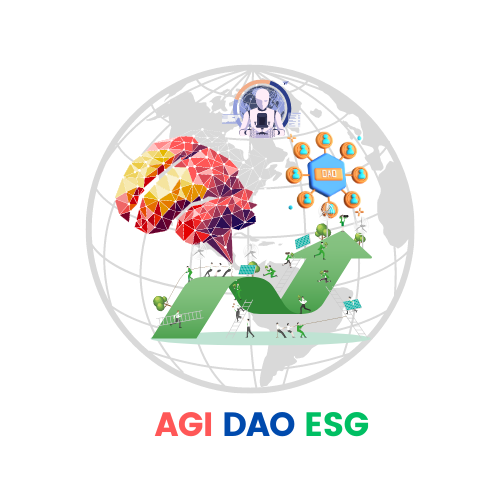A unified approach that combines the concepts of Artificial General Intelligence (AGI), Decentralized Autonomous Organizations (DAOs), and Environmental, Social, and Governance (ESG) criteria has the potential to revolutionize the way organizations operate. This integration presents a fascinating intersection of technology, organizational structure, and sustainability, paving the way for intelligent, decentralized organizations that prioritize ethical and sustainable practices.At its core, AGI refers to highly autonomous systems that possess the ability to outperform humans in most economically valuable work. By incorporating AGI into the fabric of organizations, decision-making processes can be enhanced and optimized. AGI systems have the potential to analyze vast amounts of data, identify patterns, and make informed decisions based on predefined criteria. This can be particularly useful when it comes to incorporating ESG criteria into decision-making processes.ESG criteria encompass a set of standards that measure the environmental, social, and governance impact of an organization’s operations. By integrating AGI into the decision-making process, organizations can leverage the power of data analysis to assess the impact of their actions on the environment, society, and governance practices. This would enable organizations to make more informed decisions that prioritize sustainability and ethical practices.Decentralized Autonomous Organizations (DAOs) are another key component of this unified approach. DAOs are organizations that operate on a decentralized model, where decision-making power is distributed among stakeholders. By combining AGI and DAOs, organizations can create intelligent, decentralized systems that promote transparency, accountability, and stakeholder participation. This ensures that decisions are made collectively, with input from various stakeholders, rather than by a centralized authority.The integration of AGI, DAOs, and ESG criteria has the potential to create organizations that operate based on ethical and sustainable principles. These organizations would leverage AGI to analyze data and make decisions that prioritize environmental protection, social equity, and good governance. The decentralized nature of DAOs would promote transparency and accountability, ensuring that decision-making processes are inclusive and representative of all stakeholders.One potential application of this unified approach is in the field of supply chain management. By incorporating AGI, organizations can analyze supply chain data in real-time and identify areas where sustainability and ethical practices can be improved. DAOs can then facilitate the implementation of these improvements by involving all stakeholders in the decision-making process, ensuring that the supply chain operates in line with ESG criteria.Another potential application is in the field of investment management. By leveraging AGI to analyze ESG data, organizations can make more informed investment decisions that align with sustainability and ethical principles. DAOs can then ensure that these decisions are implemented in a transparent and accountable manner, with input from all stakeholders.In conclusion, the integration of Artificial General Intelligence, Decentralized Autonomous Organizations, and ESG criteria presents a unique opportunity to create intelligent, decentralized organizations that prioritize ethical and sustainable practices. By leveraging AGI to analyze data and make informed decisions, organizations can ensure that their operations align with ESG criteria. DAOs can then facilitate the implementation of these decisions in a transparent and inclusive manner. This unified approach has the potential to revolutionize the way organizations operate, promoting sustainability, transparency, and stakeholder participation.
The Intersection of Artificial General Intelligence, Decentralized Autonomous Organizations, and ESG Criteria
/

Leave a Reply